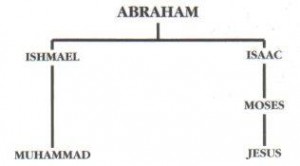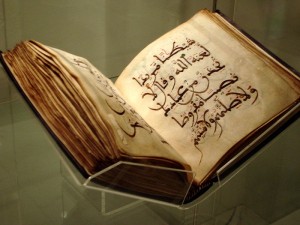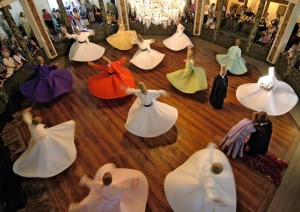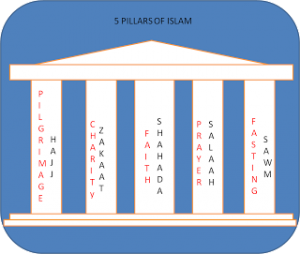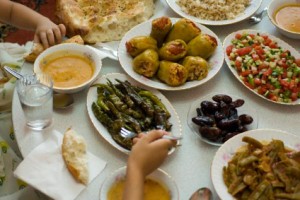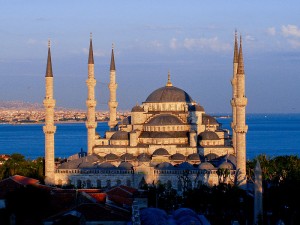Islam
Islam was founded in the beginning of the 7th century C.E. when the prophet Muhammad had visions while in Jerusalem, sitting on the foundation of the Jewish Second Temple. His vision had Abraham, Moses, and Jesus handing him teachings and sayings that he then wrote down, in what would become known as the Qur’an, when he awoke from his vision. The foundation on which Muhammad had his vision is thus very important to Muslims, and they built the Dome of the Rock on it (which is presently causing disputes with Jews who wish to rebuild the Temple, but the Temple, according to God’s specifications, can only be built on that spot).
It is believed that the first Muslims were descendants of Ishmael, the first son of Abraham that he had conceived with his wife’s maidservant (Hagar). Hagar and Ishmael were then banished by Sarah (Abraham’s wife). But God took care of them and blessed Ishmael to have many descendants, just as He had done with Isaac (Abraham’s son with Sarah).
Source: http://images.sodahead.com/profiles/0/0/1/9/6/6/1/3/1/Abraham-13763656194.jpeg
Muhammad’s teachings spread quickly and the believers were called Muslims. It was one of the fastest growing religions at the time, far outstripping Christianity in pace, but not yet in numbers. (The spread of Christianity had been slowed by the persecutions by the Romans, whereas Islam did not truly face much persecution until it went into Europe and faced Catholics who were afraid that Islam would take over their traditions). Islam spread throughout the Middle East and even so far as India, where believers met Jews and Christians alike. When believers asked Muhammad for advice on how to treat Jews and Christians, he answered with “They are people of the book, so treat them the same as you would a fellow Muslim.” Muhammad did not hate Jews nor Christians, for both groups were monotheistic and were important in the history of Islam. Muslims believe that Jesus was a prophet (though that is shocking to most non-Muslims today).
In Islam, just as in Christianity, there is a ‘Day of Resurrection’ and judgment. The specifics are different, but the basic concept is the same between the two faiths. On the day of resurrection, God will raise everyone up from the dead in order for them to be judged. Those who had faith in God and did good deeds will gain entry into Heaven and those who did not believe in God and did bad deeds will not gain entry. Those who believe but did some bad deeds will be judged based on if they asked forgiveness for their sins before they died, and God can forgive them if he so chooses.
Religious Text:
-Qur’an- A compilation of teachings, sayings, and visions of Muhammad who is considered to be the last Prophet of God after Jesus. It was written in the early 7th century after Muhammad had his revelation on the old Temple Mount. In order to recite or interpret the Qur’an, one must have traditional training. It has a vernacular use, at least in South Asia and perhaps other places as well, as a healer or guide (the words of the Qur’an are spoken over things to heal or guide them).
Source: http://en.wikipedia.org/wiki/File:IslamicGalleryBritishMuseum3.jpg
Two Sects of Islam (and Sufism):
-Shia/Shiite
- Partisans of Ali- they believe that the sons of Muhammad should have been the appointed leaders of Islam after their father died, regardless of the measure of their faith.
-Sunni
- People of the tradition (of Muhammad) – they believe that those leaders who were elected by the people were the rightful leaders after Muhammad died. They first look to the Qur’an for instruction in how to live, then the hadith (a collection of Muhammad’s words, actions, and characteristics). If they cannot find the answer in either of those texts, they turn to one of four schools of thought; each school is based on the teachings of one of the four leaders that followed after Muhammad. In Pakistan (and the world in general), this is the more common of the two sects of Islam.
Sufism is a way of practicing Islam that is very popular in India. It is NOT a sect. It involves much dancing, celebration, and music. It is a mystical path that gives its practitioners an intimate relationship with, and knowledge of, God. It is a path laid out by a master/teacher (Murshid) that a new person can follow. In India, there are tombs of Sufi saints, people who have perfected this ‘way’ of being Muslim, that are visited by people of all faiths, including Christianity and Judaism. Some Orthodox Muslims believe that this practice of visiting and venerating Sufi Saints is Shirk (see vocabulary). Some Sufi Muslims pray to the Saints for intercession, just as Catholics do to the Christian Saints.
Source: http://upload.wikimedia.org/wikipedia/commons/b/bf/Whirlingdervishes.JPG
5 Pillars:
Each Muslim must practice each of these pillars in order to be thought of as having done good deeds and being a good Muslim. They center around: God, venerating him, and showing devotion by giving up things that they enjoy (example: food during times of fasting).
-Testimony- Saying the Islamic creed: “There is no God but Allah; Muhammad is Allah’s messenger.” (‘Allah’ is a name for God, but he is the same as the Jewish ‘Yahweh’ and the deity that Christians call ‘God’.)
-Prayer five times a day- Prayer is required at certain times of day. The Muslim faces the direction Mecca is in (Muslims in the United States thus pray facing east).
-Fasting- Not eating from sunrise to sunset during certain holidays (especially important with Ramadan).
-Alms-giving- Giving of money or time to the poor and needy.
-Pilgrimage- The journey to Mecca a Muslim must make at least once in his or her life.
Source: http://architectureinislam.blogspot.com/
Holidays*:
-Ramadan- A month of fasting from sunrise to sunset. It is the ninth month of the Islamic year and commemorates the month in which the Qur’an was given (written down) to Muslims by God. At the end of each day, families, and sometimes friends, gather to break their fast together.
Source: http://www.timeanddate.com/holidays/turkey/ramadan-feast
-Al Hijra (New Year) – The first day of Muharram, the month in which Muhammad moved from Mecca to Medina.
-Eid Al-Fitr (Festival of Breaking the Fast) – The festival celebration that marks the end of Ramadan. It lasts three days and involves communal prayer, visiting graves, receiving presents, wearing new clothes, etc.
-Eid Al-Adha (Festival of the Sacrifice) – Takes place at the end of the pilgrimage to Mecca. It also commemorates the faith of Abraham.
-Ashura- Day of fasting to remember the days that Noah stepped out of the ark (after 40 days of rain) and the day that Moses was saved from the Egyptians by God. However, when relations between Jews and Muslims worsened, Muhammad made the fast optional and it remains that way for Sunni Muslims. Shi’a Muslims, on the other hand, celebrate it as a day of remembrance for the death of Muhammad’s grandson, Husayn, who died after suffering in rebellion against tyranny, injustice, and oppression.
*The majority of this information came from: http://www.religionfacts.com/islam/holidays.htm
Vocabulary:
-Masjid- Name for mosque in South Asia (mostly Pakistan today, as it is a predominantly Islamic country and India no longer has vast populations of Muslims).
-Mosque- Place of worship for Muslims (or place of prostration).
The Haggia Sophia in Istanbul
Source: http://en.wikipedia.org/wiki/File:The_Blue_Mosque_at_sunset.jpg
-Shirk- Assigning a partner or comparison to God (thinking that something has more importance than God – education, wealth, looks, etc.).

